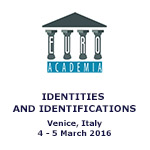Euroacademia Conferences
 Europe Inside-Out: Europe and Europeanness Exposed to Plural Observers (9th Edition) April 24 - 25, 2020
Europe Inside-Out: Europe and Europeanness Exposed to Plural Observers (9th Edition) April 24 - 25, 2020 Identities and Identifications: Politicized Uses of Collective Identities (9th Edition) June 12 - 13, 2020
Identities and Identifications: Politicized Uses of Collective Identities (9th Edition) June 12 - 13, 2020 8th Forum of Critical Studies: Asking Big Questions Again January 24 - 25, 2020
8th Forum of Critical Studies: Asking Big Questions Again January 24 - 25, 2020 Re-Inventing Eastern Europe (7th Edition) December 13 - 14, 2019
Re-Inventing Eastern Europe (7th Edition) December 13 - 14, 2019 The European Union and the Politicization of Europe (8th Edition) October 25 - 26, 2019
The European Union and the Politicization of Europe (8th Edition) October 25 - 26, 2019 Identities and Identifications: Politicized Uses of Collective Identities (8th Edition) June 28 - 29, 2019
Identities and Identifications: Politicized Uses of Collective Identities (8th Edition) June 28 - 29, 2019 The European Union and the Politicization of Europe (7th Edition) January 25 - 26, 2019
The European Union and the Politicization of Europe (7th Edition) January 25 - 26, 2019 7th Forum of Critical Studies: Asking Big Questions Again November 23 - 24, 2018
7th Forum of Critical Studies: Asking Big Questions Again November 23 - 24, 2018 Europe Inside-Out: Europe and Europeanness Exposed to Plural Observers (8th Edition) September 28 - 30, 2018
Europe Inside-Out: Europe and Europeanness Exposed to Plural Observers (8th Edition) September 28 - 30, 2018 Identities and Identifications: Politicized Uses of Collective Identities (7th Edition) June 14 - 15, 2018
Identities and Identifications: Politicized Uses of Collective Identities (7th Edition) June 14 - 15, 2018
Forward an Anthropological Perspective of Alzheimer’s Disease: The Symbolic Meanings of Memory Loss in a Commemoration Society
-
-

-
Presentation speakers
- Gloria Frisone, École Des Hautes Études en Sciences Sociales (EHESS), Paris
- Download presentation
Abstract:
This intervention is based on some reflections from an ethnographical research about the cultural meanings of aging, dementia and memory loss in Alzheimer’s disease in contemporary society. In the common sense and in the classification of diagnosis, aging and dementia are considered as one of the dramatic and disturbing experiences of human condition. This work aims to explain the cultural reasons of this apocalyptic scenario considering the cultural meaning of memory loss in a society which defines its collective identity in historical et memorial terms, mostly by the political performances of commemoration. By the description and analysis of a particular commemoration ceremony of the very recent event of terrorism attack in Paris on January 2015, I would like to demonstrate that the commemoration practice in not really based on the historical objectivity of the past event but rather on a political performance promoting the mythisation of it, in order to reinforce the social cohesion around a dominant system of values at the bottom of collective identity. This argument allows concluding that in the contemporary commemoration society which defines the collective identity on the memory and memorial practices, the person suffering Alzheimer’s disease and memory dysfunction is not fully considered like a legitimate member of the social group.
-
Related Presentations

Transcending Borders: Sheila Mysorekar’s Reflections on Transnational Identities
- Jennifer E. Michaels

Public Movement: Performing Politics through Conflictual Coreographies
- Francesco Spampinato













